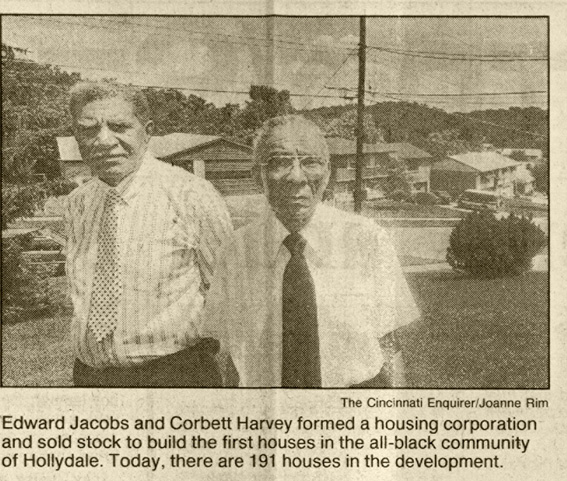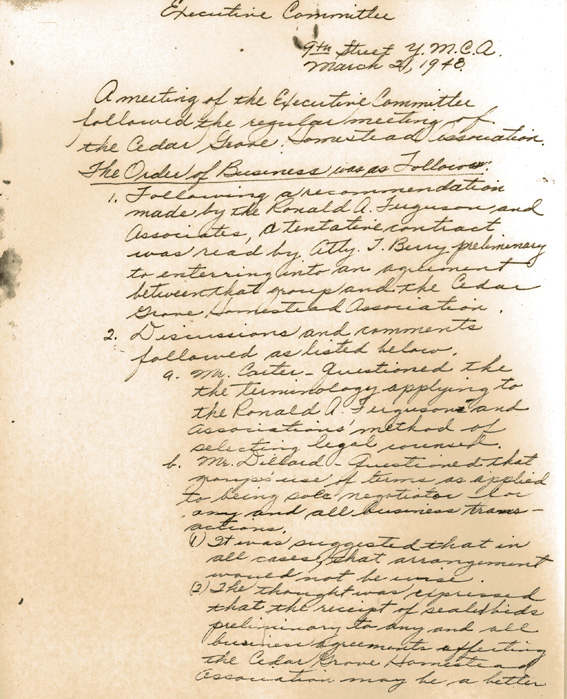By Laura Laugle
 On May 28, 1948, less than a year after its initial formation, Cedar Grove Homestead Association had the funds available to authorize Berry to begin negotiations to purchase a 93 acre tract of land. The final price for the land: $17,500. Unfortunately, getting the owner to sell to an association made up entirely of African Americans wasn’t so easy…
On May 28, 1948, less than a year after its initial formation, Cedar Grove Homestead Association had the funds available to authorize Berry to begin negotiations to purchase a 93 acre tract of land. The final price for the land: $17,500. Unfortunately, getting the owner to sell to an association made up entirely of African Americans wasn’t so easy…
The problem for Berry and his partners was, as expected, discrimination. The chosen plot of land for the subdivision which would be named “Hollydale” was a farm in Springfield Township near Glenview Golf Course. In the article to the right, original Cedar Grove Homestead Association member Edward  Jacobs explains “we were told by the farmer who owned the land that he’d rather see the land full of weeds and rabbits before he would sell it to us… Once we raised enough money, we had to get a white lady in Glendale to buy the land in her name and turn it over to the association.” Banks too were reluctant to help and the project stalled while financing was worked out for land clearance, initial construction and the planting of trees on the corn covered land.
Jacobs explains “we were told by the farmer who owned the land that he’d rather see the land full of weeds and rabbits before he would sell it to us… Once we raised enough money, we had to get a white lady in Glendale to buy the land in her name and turn it over to the association.” Banks too were reluctant to help and the project stalled while financing was worked out for land clearance, initial construction and the planting of trees on the corn covered land.
Even without the ever present problem of discrimination, an undertaking of this scale by people with little to no experience in the field was bound to suffer numerous setbacks and delays. Site plans were done up in a timely manner, but the Federal Housing Administration wouldn’t approve them as they were. Changes had to be made and the whole thing had to be re-submitted, going through governmental red tape all over again. Reliable contractors had to be found who were willing to work within the mass production plan set out in the Brookeplan and to work with an all black association.
All of these delays caused one huge problem: members who had been in need of homes back in 1947 found housing before homes could be built for them at Hollydale in the mid to late 1950s. The result was an enormous expense for the Cedar Grove Homestead Association which had to refund many of its original members’ investments. Gail Berry remembers her father going to Cedar Grove meetings and to the build site at Hollydale in Springfield Township many times during her childhood. Fortunately, as Berry points out in the article to the right, this type of persistence paid off and the association managed to build a safe and stable community for Cincinnati’s black residents.
In 2010, the University of Cincinnati Libraries received a $61,287 grant from the National Historical Publications and Records Commission of the Archives and Records Administration to fully process the Theodore M. Berry Collection in the Archives & Rare Books Library. All information and opinions published on the Berry project website and in the blog entries are those of the individuals involved in the grant project and do not reflect those of the National Archives and Records Administration. We gratefully acknowledge the support of NARA.


